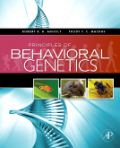
How do genes determine behavior? How much of behavior is nature versus nurture? How do behaviors evolve? Anholt and Mackay, leading scholars in the field of behavioral genetics, address these questions and much more in this comprehensive textbook that defines the emerging field of behavioral genetics. The provides a range of examples, such as laboratory studies on flies and mice, field observations on species as diverse as butterflies and meerkats, and human behavioral disorders. The book blends classical and modern genetic principles withneurobiological and ecological perspectives to teach students how to find andmap genes that affect behaviors, as well as how the coordinated expression ofensembles of these genes enables the nervous system to express complex behaviors in response to changes in the environment. Principles of Behavioral Genetics introduces us to the fascinating science that aims to understand how our genes determine what makes us tick.Principles of Behavioral Genetics presents a comprehensive overview of the relationship between genes, brain and behavior. Introductory chapters provide clear explanations of basic processes of the nervous system and fundamental principles of genetics of complex traits without excessive statistical jargon. Individual chapters describe the genetics of social interactions, olfaction and taste, memory and learning, circadian behavior,locomotion, sleep, and addiction, as well as the evolution of behavior. Whereas the focus is on genetics, neurobiological and ecological aspects are also included to provide intellectual breadth. The book uses examples that span the gamut from classical model organisms to non-model systems and human biology, and include both laboratory and field studies. Samples of historical information accentuate the text to provide the reader with an appreciation of the history of the field. All chapters contain general overviews, concise summaries, study questions that promote not only memorization but also contemplation of the material, and recommendations for further in-depth reading. An extensive glossary that defines the terminology used in the book is included. This textbook encompasses a broad definition of the emerging science of behavioral genetics. INDICE: Introduction and historial perspective. Mechanisms of neural communication. Functional organization of the nervous systems. Measuring behavior: sources of genetic and environmental variation. Mapping genotype to phenotype in populations. Partitioning phenotypic variance and heritability. Estimating heritability. Quantitative trait locus mapping. Mutagenesis and transgenesis. Genocmis approaches in behavioral genetics. Nerurogenetics of activity and sleep. Genetics of social interactions. Genetics of olfaction and taste. Learningand memory. Genetics of addiction. Evolution of behavior.
- ISBN: 978-0-12-372575-2
- Editorial: Academic Press
- Encuadernacion: Rústica
- Páginas: 334
- Fecha Publicación: 01/01/2010
- Nº Volúmenes: 1
- Idioma: Inglés
